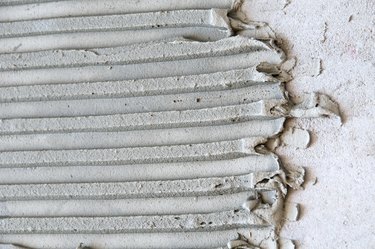
Thinset mortar is a cement-based product that is used to install ceramic and natural stone tiles. Similar to concrete, thinset dries and cures over a period of several days. While there is an average curing time for thinset mortars and grouts, a few external factors can affect the drying time.
Pre-Mixed Thinset
Video of the Day
If you opt for a pre-mixed thinset for your ceramic tile installation, you will be waiting double the time estimated for normal cement-based thinsets. While traditional dry-mixed thinset only takes between 24 and 72 hours to cure on average, pre-mixed thinsets can take between four and six days in normal conditions, and up to two weeks to dry in humid and cold climates.
Video of the Day
Excessive Humidity
The labels on all thinset containers carry a disclaimer from the manufacturers that excessive humidity and moisture can directly affect the curing time of the concrete within the thinset. If you live in a tropical environment or somewhere where the humidity is high, your thinset will take longer than the 72-hour maximum curing time given as an estimate by most manufacturers.
Type of Tile
Man-made tiles such as ceramic or porcelain are not porous by nature. Natural stones such as travertine, marble, granite and slate are. Ceramic tiles naturally take longer to cure in comparison to natural stone counterparts because of this fact. Instead of curing through the face of the stone and through the grout joints as well as the underlayment, ceramic tile installations can only cure through the joints and the slab or underlayment, which takes longer.
Size of the Grout Joint
Since the grout joint is part of the way in which thinset mortar receives air to cure the cement, a smaller grout joint can directly affect the drying time of the tile installation if you are working with ceramic tile versus natural stone. Larger joints will cure more quickly, while tight joints will be within the 72-hour maximum curing time on average.